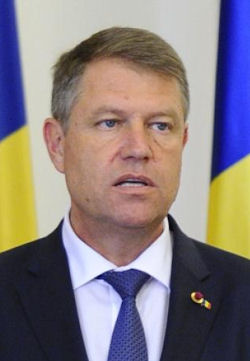President Klaus Iohannis - 2014
 Romania voted for a new president November 02, 2014. Analysts said Prime Minister Victor Ponta would likely become the country's new leader. Ponta was expected to win the first round of voting among 14 candidates, but not by enough to avoid a runoff in December. The former prosecutor pledged, if he was elected, to lower taxes, raise pensions and to uphold good relations with the European Union. Incumbent President Traian Basescu was stepping down after 10 years in office. Prime Minister Victor Ponta led with about 40 percent of the vote, while his main challenger, Klaus Iohannis, got 30 percent. The prime minister and the mayor of the city of Sibiu would face each other in the runoff, held 16 November 2014.
Romania voted for a new president November 02, 2014. Analysts said Prime Minister Victor Ponta would likely become the country's new leader. Ponta was expected to win the first round of voting among 14 candidates, but not by enough to avoid a runoff in December. The former prosecutor pledged, if he was elected, to lower taxes, raise pensions and to uphold good relations with the European Union. Incumbent President Traian Basescu was stepping down after 10 years in office. Prime Minister Victor Ponta led with about 40 percent of the vote, while his main challenger, Klaus Iohannis, got 30 percent. The prime minister and the mayor of the city of Sibiu would face each other in the runoff, held 16 November 2014.
Klaus Iohannis, age 55, won about 54 percent of the 16 November 2014 vote, a surprising change from the first round of balloting in which he trailed Prime Minister Victor Ponta, age 42, by 10 percent. Iohannis was moving swiftly to make good on a campaign promise and allay European Union fears over graft in the country. He had also campaigned to safeguard the independence of Romania's judicial system. President-elect Iohannis immediately urged parliament to scrap a corruption bill that allowed for amnesties in certain criminal cases, providing a judicial shield for some politicians. Center-right politician Klaus Iohannis was sworn in as Romania's president on 21 December 2014, promising to crack down on corruption and strengthen institutions 25 years after the fall of communism.
By 2015 the "step by step" policies of Liberal President Klaus Iohannis (PNL) have been criticized by many as being too tentative: nevertheless, his repeated calls for Ponta's resignation were not ineffectual. They increased political pressure on the prime minister and his cabinet, which, according to the constitution, the president is allowed to do. That is something that the Social Democratic Party (PSD) and their coalition partners, the so-called Progressives (UNPR), who had been in control thus far, only seem to have partially understood.
By 2017 the core problem for Romania was that while the head of state racked up foreign-policy achievements in Berlin, Brussels and Washington and works to integrate Bucharest more closely with the EU and NATO, the political parties aren't in the position to guarantee domestic stability. The liberal and conservative opposition are too weak to fight against the coalition. Additionally, they are too concerned with themselves and their constantly delayed inner-party reforms to offer a credible alternative to disappointed voters.
Dragnea's determination to weaken the judiciary and the rule of law, in order to secure impunity for himself and his cronies, does not bode well for the country. The Constitutional Court was already stacked with PSD-loyal judges, and a new, willing justice minister would serve as yet another instrument for Dragnea to further his agenda.
A democratic cooperation with the president - a cohabitation - would be impossible under these circumstances. Klaus Iohannis sees himself as the guarantor of the independent judiciary. At the beginning of the year he had joined the hundreds of thousands of demonstrators who had taken to the streets to defend the constitutional state. The president made clear during his recent visit to Berlin that he wouldn't deviate from this position even a millimeter.
|
NEWSLETTER
|
| Join the GlobalSecurity.org mailing list |
|
|
|

